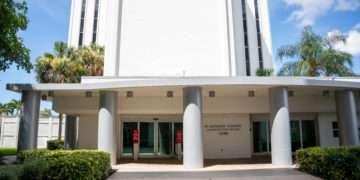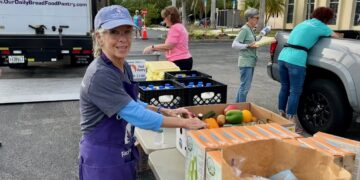There was no confusing Odilon Almeida’s explanation about the decision last year to move ACI Worldwide’s headquarters out of Collier County to Miami. As head of one of the largest global digital payment firms, Almeida had just hired two key executives for a company always on the lookout for top talent.
“I can tell you that it was much easier to convince them to work in Miami than to be in Naples, and that is going to be very important for us going forward, because we will continue to need talent in this company,” Almeida, ACI’s president and CEO, told analysts last year during a conference call to discuss the company’s future.
ACI’s departure offers insight into economic development struggles facing Southwest Florida, which historically has relied on tourism, construction and hospitality to fuel its economy. Some well-known challenges, including affordable housing and a skilled talent pool, continue to affect the region’s ability to attract and retain business. But new challenges, such as fewer state incentives and the loss of a regional program, have forced the counties to rely on their own economic development efforts.
Florida’s business incentive programs once offered counties tens of millions of dollars each year in state rebates or grants designed to help attract companies with high wages. Those state incentives helped counties diversify their economies by focusing on landing the big fish: companies in technology, financial services and other diverse industries that offer hundreds of high-paying jobs. They are the businesses that can really move the needle in a local economy with their corporate headquarters or an expansion. It’s an important part of economic development for Florida counties, separate from the work of supporting local small businesses or making deals with developers to provide commercial space that will accommodate growth.
Collier and Lee counties each have scored big wins in recent years with the announcement of major investments by companies locating or expanding in the area. Lee County celebrated decisions by cancer diagnostic company NeoGenomics to build its $60 million international headquarters and hire another 295 employees; and shipping logistics business Scotlynn USA Division Inc. to spend $20 million on expansion and a corporate headquarters, and hiring 140 workers. Collier County praised moves by medical device manufacturer Arthrex to spend more than $60 million to expand its North Naples headquarters and add more than 750 to its workforce, and by national packaging supply company Uline to build a $70 million distribution center near Interstate 75 that will include more than 200 jobs.

FOCUSED ON HEALTH: Two medical-centric companies are headquartered in Southwest Florida. Arthrex, above, is based in North Naples, while NeoGenomics, below, is building its new headquarters in Fort Myers.
But most of those wins came with the help of state and local economic development programs that no longer exist. Florida officials decided against renewing the Qualified Targeted Industries Tax Refund program last year, the latest in a series of state cutbacks in economic development incentives by elected leaders who criticized the programs as corporate welfare.
The state program, a tax refund initiative known as QTI that rewarded creation of high-wage jobs, was one of the tools that Collier and Lee officials used to encourage the investments by NeoGenomics, Scotlynn and Arthrex. Counties put up 20% of the incentives, and the state provided 80%.

NeoGenomics new headquarters
That’s one of the programs Collier County leaders used to attract ACI in 2016. After accepting more than $400,000 in various incentives for bringing its high-paying jobs to Collier, ACI snatched up Miami-Dade County’s offer last year for nearly $175,000 in rebates to relocate there and to bring 182 full-time jobs with an average salary of $182,000. That Miami-Dade incentive came on top of another $189,000 in tax rebates provided by the state and the county.
While Collier and Lee don’t have Miami’s incentive money to offer, the Southwest Florida communities are focused on attracting businesses in other ways. Collier provides local, targeted incentives for businesses to invest in areas that need commercial development, such as the $1.4 million in tax rebates offered to Uline to build its distribution center in a special Innovation Zone located in central Collier County. Lee County also targets local incentives for businesses in special development areas, including special incentives for commercial development in Fort Myers.
Collier and Lee counties are adjusting to other changes, as well, including the loss of one of the region’s economic development groups. The Southwest Florida Economic Development Alliance, a regional collaboration of local government and business leaders, shuttered in 2019. The group disbanded after leaders across the area concluded they have more differences than similarities in their economic development interests.

Penny Taylor, Collier County Commissioner
“It died a slow and natural death,” says Collier County Commission Chairwoman Penny Taylor, who served on the alliance’s board. “I think the differences between Lee and Collier, and what they attract, is night and day.”
Instead, the counties are each turning to ways to make it easier to do business here, including fast-track permitting and the targeted tax rebates. That’s a better taxpayer investment, they argue.
“If we have the funds, we’d rather put it into improving our regulatory systems,” says John Talmage, Lee County’s economic development director.
For now, Collier and Lee county officials are paving their own paths of economic development without the alliance’s formalized regional partnership, and without the millions in incentives once available from the state to attract companies with high wages. Each county is projecting more than $1 billion in new commercial development over the next few years, along with 2,000 additional jobs.

John Talmage, Lee County Economic Development Director
But one unknown is whether they can continue to attract high-wage businesses such as NeoGenomics and ACI without incentives, funded either by local taxpayers or the state. The short answer is, it’s not clear how much the counties will, or even can, do on their own.
In the case of NeoGenomics, the state provided most of the $600,000 in tax rebates offered in recent years and more than $1.7 million in other incentives. Talmage said NeoGenomics was committed to Lee County, but those incentives may have played a role.
“Whether we could have gotten the same footprint, I don’t know,” Talmage says.
The Sunshine State provides some natural advantages for businesses such as lower taxes and less regulation.
When ACI announced it was leaving Collier for Miami, Almeida also highlighted his company’s need for better access to an international airport.
“We have business in more than 80 countries, and we are very far from an international airport in Naples,” he told analysts last year. “And that was difficult to get to an airport there.”
Taylor, the Collier commissioner, said she was disappointed to lose ACI’s high-paying jobs after only a few years here. But she said there was no stopping Almeida’s desire to move the company closer to his Miami home.
“How could you fight it? The president made that decision,” she says.
But Almeida’s parting comments about Collier underscored a long-standing issue the area has faced.

Melanie Schmees, Greater Naples Chamber of Commerce
“They ended up leaving because they couldn’t find the workforce,” says Melanie Schmees, director of business and economic research for the Greater Naples Chamber of Commerce.
In 2014, the chamber worked with county leaders to craft a shared economic development vision, identifying strengths and weaknesses that affect business development. The Opportunity Naples report identified Collier County’s challenges, including a limited workforce, housing affordability and scarce supply of land for commercial development.
The report also summarized the conflict in Collier between those who want to limit business development, to preserve the retirement lifestyle they prefer, and those who want to attract new businesses to the area to expand the county’s economic base with industries less vulnerable to national and global downturns.
“Efforts to preserve the quality-of-life elements that have, and continue to, define the attractiveness of the area as a seasonal, retirement and tourism destination have resulted in other trends that negatively impact the community’s ability to diversify its economy, sustain a competitive workforce, seed and grow an entrepreneurial ecosystem and foster a business climate conducive to targeted growth and investment,” the Opportunity Naples report noted. “If Greater Naples is to continue to evolve as both a lifestyle destination and a thriving, diverse economic region, a balance must be struck between the desire to preserve the qualities that draw residents and visitors and the strategies and tactics that will enhance the ability of local economic developers and other professionals to retain, expand, attract and grow quality jobs in Collier County.”
That continued clash of philosophy may explain why Collier County really isn’t considered a big player in the economic incentives competition.
“It’s not as active in incentives as other jurisdictions are,” Schmees says.
The county has handed over more than $2 million in incentives in recent years to Arthrex, its largest private employer. But other projects drawing taxpayer-funded incentives from the county focus more on the area’s lifestyle and tourism draw.
County commissioners agreed to provide up to $5 million in tax rebates for a $250 million residential and commercial complex in East Naples as part of an effort to revitalize the distressed area. Commissioners recently agreed to $15 million in incentives for the Great Wolf Lodge family resort planned near the county’s $100 million Paradise Coast Sports Complex, a huge investment in the area’s sports tourism.

INVESTING IN FAMILIES: Chicago-based Great Wolf Resorts received a $15 million incentive from Collier County to build its Great Wolf Lodge hotel and water park project, below, next to the new Paradise Coast Sports Complex, top.
“We are diversifying,” Taylor says, also pointing to the Uline project. She noted the Arthrex expansion is evidence that “we must be doing something right.” Taylor argues the Naples area, founded by some of the nation’s wealthiest tycoons as a retirement and vacation destination, doesn’t have to be where corporate executives build their headquarters, but where they want to live and play.
“We need to be who we are, instead of trying to be who we will never be,” she says.

Great Wolf Lodge hotel and water park project
But other commissioners have advocated a stronger county incentive program to attract new companies. Commissioner William McDaniel has argued that without such a program, the county risks jeopardizing future economic growth and stability.
“Government can have a role in investing in these projects,” he says.
McDaniel and others are supporting several proposed village developments in east Collier that would open some of the environmentally sensitive acreage in the Rural Land Stewardship Areas to residential and commercial growth. That would address one of the challenges identified in the 2014 Opportunity Naples report—the need for more developable land for commercial use.
But commercial growth can’t come at the expense of the main draw of Collier’s natural assets, the environment and habitat, Taylor said. The county must protect its reputation as a paradise destination and build on its recent economic development successes.
“It’s never going to be perfect, but it’s better than it was three years ago.”
LEVERS FOR GROWTH
Lee County has a long history of offering local business incentives, including some disappointments along the way.
The county set aside $25 million in taxpayer money in 2008 for the Financial Assistance for Recruiting Strategic Targets initiative. The cash incentive fund known as the FIRST program was created to attract businesses to the Fort Myers area. At the time, it was promoted as a bold local initiative designed to entice companies to expand and relocate.

CORPORATE GROWTH: Major companies receiving economic incentives for locations in Southwest Florida include Hertz (above), which has its world headquarters in Estero, and Uline (below), which plans a large distribution center in Collier County.
But the FIRST program is perhaps best known for the scandal that resulted in federal convictions for executives at VR Labs, who were found guilty in 2019 of defrauding the county out of $4.7 million in incentives. Executives misrepresented their business interests and failed to deliver the botanical pharmaceutical manufacturing plant that VR Labs promised. The FIRST program scored successes, including luring the corporate headquarters of national rental car company Hertz and the 700 jobs that came with it. But the VR Labs debacle led to a revamping of Lee County’s economic development program, including changes in staff and protocols used to ensure that businesses receiving taxpayer support kept their promises. The county later shut down the FIRST program after distributing more than $20 million in incentives to such companies as Gartner Inc., Algenol Biofuels and Chico’s.
 An audit completed last year by the county inspector general praised the revamped Economic Development Office for making “great strides in developing new policies and procedures to mitigate risks.”
An audit completed last year by the county inspector general praised the revamped Economic Development Office for making “great strides in developing new policies and procedures to mitigate risks.”
“We believe that the added conditions for the payment of incentives and the updated policies and procedures have enhanced the EDO,” the audit found.
Lee County has forged ahead with its efforts to attract business, focusing on key geographic areas that were ripe for commercial growth. That includes a corridor around Alico Road that has become home to a huge surge in commercial development. The major projects there include NeoGenomics and Scotlynn. But Talmage said much of the rest of the industrial and commercial activity came without the need for incentives.

ECONOMIC STIMULATION: The new corporate headquarters for Scotlynn USA Division, a transportation and logistics provider, was recently built off Interstate 75 in Lee County.
“We have the levers for growth,” he says.
The county’s economic development emphasis now is less on handing out cash incentives and more about supporting business development in other ways. Targeted incentives are available for business investment in distressed areas— North Fort Myers, Cape Coral, the State Road 82 corridor, etc. Community Redevelopment Agencies in Cape Coral and Fort Myers also offer tax rebates and other incentives for business development there.
The pitch to do business in Lee County includes promoting the quality of the workforce available in the growing area; access to Southwest Florida International Airport, now in the early stages of a $360 million expansion that includes a new traffic control tower and terminal; and the benefits that come with four-year institution Florida Gulf Coast University, such as training and research partnerships.
Add all of that to the natural advantages Florida offers business, including low taxes and less regulation, and Lee County doesn’t need to throw money at companies to locate here, Talmage argued.
“That offsets the need for incentives,” he says.
While Lee County officials have joined other economic development leaders around the state who are seeking reinstatement of lost Florida business incentives, including the $35 million a year QTI rebate program, Talmage says “we don’t feel it’s going to hold us back” without them.
“If a company is chasing incentives, when those expire, chances are they will chase them elsewhere,” he says.





